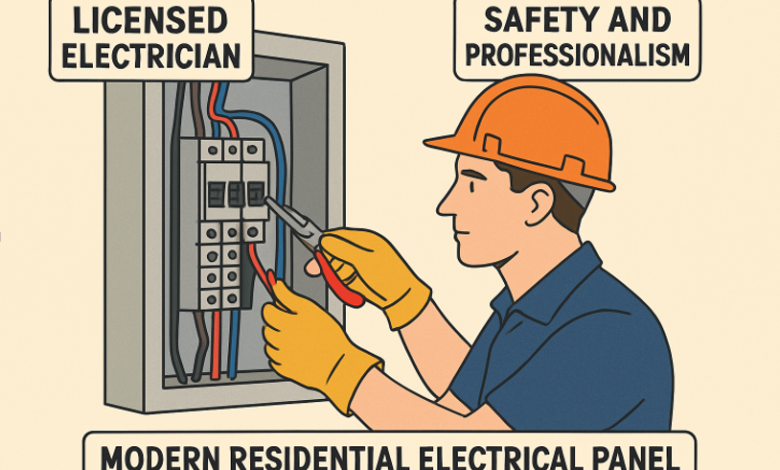Residential Rewiring: Expert Safety Standards Compliance

Upgrading your home’s wiring to meet current safety standards is a wise investment for your property and well-being. Modern homes rely heavily on electricity, from everyday appliances to advanced tech, meaning your wiring must be safe, efficient, and code-compliant. If you’re considering an upgrade, you must trust professionals with up-to-date knowledge, like Wilmington, NC house rewiring services by licensed electricians, to handle the job. Their expertise ensures every aspect of your electrical system is replaced or enhanced with careful attention to modern codes and best practices.
House rewiring isn’t just about addressing visible problems—it’s a proactive approach to accident prevention and long-term value. Old or faulty wiring is a primary cause of household electrical fires, and many insurance providers require compliance with the latest standards. Ignoring these issues can have serious consequences for safety and future property sales. Peace of mind in a modern, expertly rewired system is invaluable.
From recognizing the signs of electrical wear to understanding the thorough, step-by-step process of rewiring, informed homeowners make the safest decisions for their families. Licensed professionals don’t just swap wires; they navigate permitting, code updates, and final inspections to ensure the project is done right.
Compliance with modern standards and regular upgrades also paves the way for safely integrating new technologies, adding convenience and efficiency without compromising safety. Prioritizing expert help is an investment in your property’s safety and value for years.
Signs Your Home Needs Rewiring
Older homes commonly feature wiring that can no longer meet today’s electrical loads and safety expectations. Keep an eye out for obvious clues—a circuit breaker that trips often, lights that flicker or dim when appliances turn on, outlets or switches that feel warm or look discolored, or the lingering presence of outdated systems like knob-and-tube or aluminum wiring.
If you notice a lack of grounded outlets or no GFCI (ground-fault circuit interrupter) outlets in bathrooms, kitchens, or laundry rooms, your home’s wiring is due for an upgrade. making services like Fire Watch Companies in San Antonio essential in high-risk situations. Addressing these problems early is critical for well-being and property protection.
Importance of Updated Electrical Codes
Like those found in the National Electrical Code (NEC), electrical codes undergo regular revisions every three years to reflect technological advances and understanding of safety best practices. For example, modern codes require improved protection around wet areas, more robust grounding, and increased circuit capacity to match today’s electricity demand. These regulations aren’t arbitrary—they’re informed by research and incident data, and law requires compliance in most jurisdictions. The National Fire Protection Association (NFPA) is a valuable resource for understanding code updates and their role in preventing house fires.
Consulting a licensed electrician ensures your rewiring project meets and exceeds local and national code requirements, preparing your home for current and future electrical loads without compromise.
See also: Improving Engine Performance with Specialized Grinding Tools
Benefits of Hiring Licensed Electricians
Entrusting your home’s rewiring to a licensed electrician brings benefits beyond a simple wire replacement. Licensed professionals are rigorously trained in safety standards, ensuring every connection, junction, and circuit meets regulations. They also handle necessary permits for passing local inspections and maintaining insurance coverage. When you sell or refinance your home, having documentation of licensed electrical work reassures buyers and lenders that your property is safe and up to code. The U.S. Department of Energy highlights how certified electricians help maximize a home’s electrical efficiency and value.
Access to the latest tools and materials means your project will be completed efficiently, precisely, and with the assurance of long-term safety.
Steps Involved in House Rewiring
- Initial Inspection: The electrician performs a comprehensive assessment to identify outdated or faulty wiring, ungrounded outlets, and safety issues.
- Planning: They design a wiring system that meets current codes and anticipates future power needs, refitting outlets, switches, and circuits as required.
- Obtaining Permits: Proper documentation is secured from relevant municipal authorities before work begins.
- Execution: Old wires are safely removed, and new, code-compliant wiring and devices are installed, minimizing disruption wherever possible.
- Testing: Every new component is rigorously tested for safety, performance, and compatibility.
- Final Inspection: A certified inspector reviews the work and provides an official stamp of approval for safety and code compliance.
Each stage is non-negotiable for a safe and successful outcome. Skipping steps or opting for DIY shortcuts can lead to serious safety and legal issues.
Cost Considerations and Financing Options
The cost of house rewiring is influenced by home size, project complexity, and regional labor rates. While it’s a significant investment, many electrical contractors offer financing options and payment plans to reduce expenses. Collect multiple quotes and compare the scope of services, warranty terms, and financing flexibility. Remember, cheap solutions can result in unsafe shortcuts—quality work pays off in long-term safety and boosted property value.
Maintaining Electrical Safety Post-Rewiring
Routine electrical maintenance protects your investment and safety after a professional rewiring. Schedule periodic inspections, especially after central appliance installations or home renovations. Use appliances as directed, avoid plugging too many devices into a single circuit, and never ignore warning signs like smells of burning, warm outlets, or frequently tripped breakers. Consumer Reports provides actionable electrical fire prevention tips that every homeowner should follow. Promptly address emerging electrical issues with a licensed electrician’s guidance.
By prioritizing modern safety standards and hiring only licensed professionals for your rewiring needs, you protect your family, property, and peace of mind while ensuring your home is ready to handle present and future electrical demands safely.




